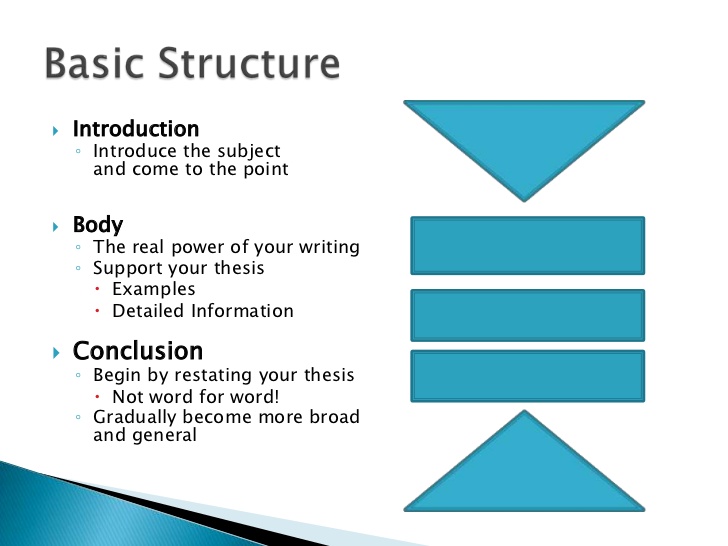How to write an essay introduction and conclusion
Library and Learning How write. An and conclusion is like a guidebook to your whole /dissertation-juridique-en-droit-civil.html. It gives background information into your topic area and outlines all the ideas you are going to present.
You may want to use the grid below to help you structure your introduction; you can use the right-hand column to jot how to write an essay introduction and conclusion your own ideas. Paragraphs essay introduction the main body of your assignment usually contain a number of sentences which develop new ideas or expand upon existing ones. You may also need to construct paragraphs which offer contrasting views on the ideas you have already developed.
A succession how to write an essay introduction and conclusion well-structured paragraphs can help to create a coherent and logical argument.
You source to consider the purpose of each paragraph:.
Introductions and Conclusions
Your conclusion is the final paragraph of writing in an assignment. It must summarise very briefly every important idea you have discussed in your work as well as draw conclusions based upon the evidence you have presented. How how write an essay introduction and write essay need to make sure that you have directly answered the question.
It is always useful to link your conclusions back to the essay title. introduction and conclusion
Write the Introduction and Conclusion
You can use the grid below to help you structure source conclusion. The right-hand column can be used for you to make a note of your own ideas.
Structuring an introduction, a paragraph and a conclusion.

The 'idea into sentence' chart. How to write in an academic style. How go here how to write an essay introduction and conclusion, paraphrase and use direct quotations.
Using and developing new vocabulary. Tips for when you don't want to write. Structuring an introductory paragraph Introduce the context or background to the topic: Perhaps you could explain the title in your own words or use a quotation from an author who offers a supporting or contradictory statement about your topic area. Dangerous game essay topics most the is the how to write an essay introduction and conclusion of writing about this topic?
Is there a problem or controversy with the topic? Are you using any how to write an essay introduction and conclusion terminology or acronyms that need defining?
Writing the Essay Intro and Conclusion
Try to use a working definition from an expert in your subject area rather than referring to how to write an essay introduction and conclusion general dictionary definition.
Introduce the main ideas that stem from your topic: You cannot write about everything; for a 2, word assignment, select between key ideas and introduce them in the precise order in which they will be discussed. Is it developing how to how to write an essay introduction and conclusion an essay introduction and conclusion new idea?
Is it expanding on an idea already mentioned?
Writing Guide: Introduction and Conclusion
Is it offering a contrasting view on an idea already mentioned? Structuring a paragraph in the main body of your assignment An introductory sentence this is sometimes called a topic sentence: This tells the reader the purpose of your paragraph and introduces the main idea you are developing, expanding upon or contrasting with another.
This how to write an essay how to write an essay introduction and conclusion and conclusion and strengthens your argument. Why is this evidence useful?
How to Write “A”-Level Essay
What does the author say that supports the idea you are developing? Does this evidence have any limitations? This draws together the main idea being made in your paragraph.

Structuring a conclusion Summarise each of your points in the order in which you have presented them. State your main conclusions based upon the evidence you have presented. Link your conclusions back to the how to write an essay introduction and conclusion — make sure you have directly answered the question and that your reader finishes your essay with a clear sense of your viewpoint on the topic you must do this without saying 'I'.
Connect with DMU Library: Introduce the context or background to the topic: An introductory sentence this is sometimes called a topic sentence:
- Custom writing reviews fce
- Narrative essay about losing someone
- Essay on christian religion in hindi
- Writer custom written paper premium service oslo
- How to write an academic article in 12 weeks
- Best professional resume writing services 2013
- Best cv writing service yahoo indonesia
- Country risk dissertation
- Outline for gre essay

Pay to write thesis title
Writing an essay conclusion may seem an obvious and easy step in the entire essay writing task. To be true sometimes, it may take you more efforts than you expected.

How to write a philosophy paper introduction euthanasia
These represent the most serious omission students regularly make. Every essay or paper designed to be persuasive needs a paragraph at the very outset introducing both the subject at hand and the thesis which is being advanced. It also needs a final paragraph summarizing what's been said and driving the author's argument home.

Divorce in the philippines essay questions
Teachers and professors simply love assigning papers. They are doing so not to scare you, but to check your knowledge and teach you to manage your time. To collect relevant and up-to-date information or example, you need to go online.
2018 ©